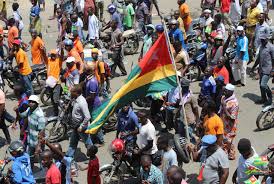Authorities in Togo have released 56 individuals arrested during recent anti-government protests, while others remain in custody as investigations continue, the public prosecutor announced on Monday.
The protests, which took place between the night of June 5 and 6, saw demonstrators gather in various parts of Lomé, including areas near the presidential palace, to denounce rising electricity prices, the arrest of dissenting voices, and controversial constitutional reforms introduced under President Faure Gnassingbé, who has ruled the West African nation since 2005.
The demonstrations were reportedly triggered by a call from popular rapper Aamron, born Essowe Tchalla, who has been a vocal critic of the government. He was arrested on May 26 at his home, just hours after encouraging citizens to join the protests. His sudden reappearance in a video from a psychiatric hospital—where he apologised to President Gnassingbé and claimed to be battling “severe depression”—has further fueled speculation and public outcry.
While protests have been banned in Togo since a 2022 bombing at Lomé’s central market, the law still allows public meetings. Human rights groups and opposition parties have accused the government of suppressing freedom of expression under the guise of maintaining national security.
Speaking on national television, Public Prosecutor Talaka Mawama confirmed that 56 of those detained were released due to “light charges”, though he warned that the protests appeared to be “part of a revolt against the institutions of the republic.”
“The custody period for some of those arrested has been extended to allow for certain necessary investigative steps,” Mawama said. “These people will also be presented to the prosecutor’s office in the coming hours.”
Mounting Opposition to Constitutional Changes
The protests form part of a broader movement against recent constitutional amendments, which the opposition claims were passed without proper public consultation. The amendments include a shift to a parliamentary system and a provision allowing President Gnassingbé to remain in power beyond 2025, when his current term is set to expire.
The “Hands Off My Constitution” coalition, made up of civic groups and opposition parties, strongly condemned the arrests, describing them as mass and arbitrary. In a statement shared with international media, the coalition called on the government to respect civil liberties and release all detainees immediately.
Rapper Aamron’s Detention Raises Eyebrows
Aamron, who had grown in popularity for his politically charged lyrics, was reportedly arrested without a warrant on May 26. His video apology—released 10 days later—has drawn widespread skepticism, with many suggesting it was made under duress.
His lawyer, Celestin Agbogan, confirmed that the artist is still being held in a psychiatric hospital in Lomé but clarified that no formal legal charges have been brought against him.
“There are no legal proceedings against Aamron,” Agbogan said. “We are concerned about the circumstances of his detention and are seeking clarity on his mental and legal status.”
Human rights organisations have expressed concern about Aamron’s health and safety, calling for independent access to assess his condition and ensure he is not being coerced.
Government Under Scrutiny
Togo has experienced repeated episodes of unrest over the years, primarily around presidential term limits and democratic reforms. President Gnassingbé came to power in 2005 following the death of his father, Gnassingbé Eyadéma, who ruled for 38 years. Critics argue that the Gnassingbé family has effectively maintained dynastic control over Togo for more than half a century.
The government insists that its actions are necessary to protect the republic’s institutions and prevent destabilization. However, analysts say the continued lack of political dialogue, opaque legal processes, and harsh clampdowns on dissent may only escalate public frustration.
As pressure mounts on the Togolese government from both domestic actors and international observers, the release of some protesters is seen as a tentative step toward de-escalation. Still, calls for greater accountability, transparency, and respect for human rights continue to grow louder.
